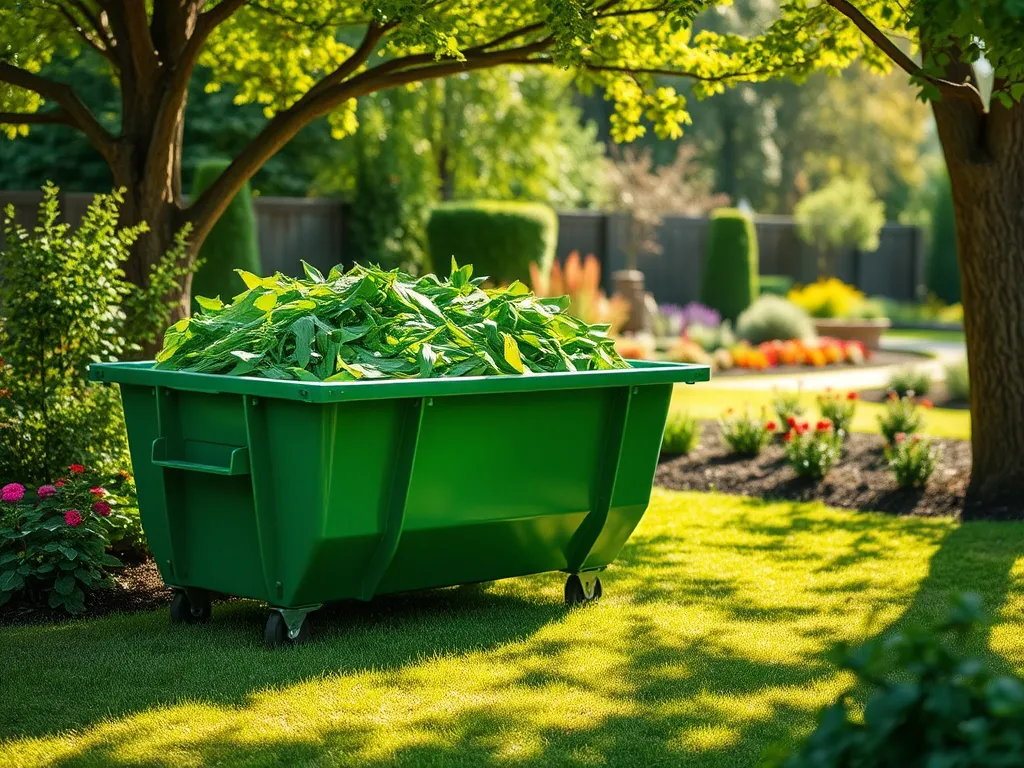Top Tips for Dumpster Rental for Yard Waste Disposal

A Comprehensive Guide to Dumpster Rental for Yard Waste
When you have a large amount of yard waste to dispose of, finding the right solution can be challenging. Dumpster rental for yard waste offers an efficient and effective way to manage fallen branches, grass clippings, leaves, and other organic debris resulting from landscaping work or seasonal cleanups. This option not only simplifies the disposal process but also aligns with environmentally-friendly practices.
Using dumpster rental for yard waste is particularly beneficial for gardeners, landscapers, and homeowners looking to tackle major outdoor projects without the hassle of multiple trips to the landfill. It provides a designated space to gather and manage waste, ensuring that your property remains neat and organized during and after your clean-up efforts. Furthermore, utilizing a dumpster can facilitate recycling and composting programs, depending on local regulations.
One of the main advantages of dumpster rental for yard waste is that it streamlines the cleanup process. Instead of bagging and transporting waste in small quantities, you have the convenience of a large dumpster that can accommodate all your yard debris in one go. Whether you are undergoing a seasonal overhaul or managing a landscaping job, a dumpster allows you to dispose of your yard waste efficiently without cluttering your driveway or yard with piles of organic material.
Managing yard waste effectively can be simple, especially when you understand How to dispose of yard waste with a dumpster rental.
Additionally, renting a dumpster for yard waste can save you both time and energy. Rather than spending your weekends hauling waste to a disposal site, you can focus on more enjoyable tasks while the dumpster handles all your yard waste. With flexible rental options available, you can choose a duration that suits your project's needs, giving you the freedom to work at your own pace.
In summary, dumpster rental for yard waste is a practical solution that caters to various disposal needs. Whether you're dealing with routine cleanups or significant landscaping projects, having a dedicated dumpster helps manage waste more effectively and contributes to a cleaner and greener environment.
Benefits of Dumpster Rental for Yard Waste
One of the key benefits of dumpster rental for yard waste is its cost-effectiveness. Most rental companies offer competitive pricing structures that can save you money compared to individual trips to the landfill. By renting a dumpster, you can dispose of all your yard waste in one go, avoiding multiple trip charges and the potential cost of disposing of waste in smaller quantities.
Convenience is another major advantage of renting a dumpster for yard waste. Having a dumpster located on-site means you don’t have to worry about transport; waste can be thrown away as you work, which significantly enhances efficiency during yard clean-up. Additionally, many companies offer flexible delivery and pick-up options, making it easier for you to plan around your schedule.
The environmental benefits of proper yard waste disposal cannot be overlooked. Dumpsters facilitate the efficient collection and diversion of organic materials from landfills, encouraging practices like composting. This approach not only reduces greenhouse gas emissions but also enriches soil health when organic materials are composted effectively.
Lastly, using a dumpster for yard waste can save a significant amount of time. Instead of spending hours bagging waste for transport, you can easily toss debris into the dumpster as you work. This convenience allows you to complete your projects quickly and with minimal disruption to your daily routine.
Choosing the Right Dumpster Size for Yard Waste
When renting a dumpster for yard waste, understanding size options is crucial. Common dumpster sizes include 10, 20, and 30 yards, with each size catering to different project scopes. A 10-yard dumpster is ideal for small cleanups, while a 20-yard dumpster suits larger residential projects. A 30-yard dumpster is best for extensive yard renovations or major landscaping jobs.
Estimating the volume of your yard waste is essential before deciding on a dumpster size. You can do this by considering the amount of debris you will generate, whether from tree trimming or a seasonal clean-up. A good practice is to visualize how much space your waste will occupy and consult with the rental company for advice on appropriate sizing.
Several factors can influence your choice of dumpster size, including the scale of your project, the type of yard waste you need to dispose of, and the regulations of your local waste disposal site. It's important to take into account the volume and weight of materials, as larger items may take up valuable space.
To maximize space in your yard waste dumpster, strategically layer your debris. Start with lighter materials at the bottom and place heavier items on top to ensure even weight distribution. You can also break down larger items to fit them better in the dumpster, making the most of the space you have.
Yard Waste Types Suitable for Dumpster Rental
When considering dumpster rental for yard waste, it's vital to understand what constitutes yard waste. Generally speaking, materials like grass clippings, leaves, branches, shrub trimmings, and small tree limbs are acceptable. Yard waste typically refers to organic materials resulting from residential landscaping and garden maintenance.
While many materials can be accepted in yard waste dumpsters, some items are prohibited. These can include items such as plastic bags, food waste, treated wood, and non-organic materials. Knowing what is and isn’t allowed can help prevent issues during disposal.
Preparing yard waste for disposal is also crucial to ensuring a smooth rental experience. This preparation entails removing any non-acceptable items and cutting larger branches into manageable lengths. Such steps help comply with rental regulations and optimize available dumpster space.
When disposing of yard waste, proper sorting is key. Separate organic materials from non-biodegradable items to avoid contamination. Familiarizing yourself with local disposal regulations will also help streamline the process and ensure your yard waste is disposed of correctly and environmentally friendly.
Local Regulations for Yard Waste Dumpster Rental
Understanding local ordinances on yard waste disposal is essential when renting a dumpster. Regulations can vary widely by location, and knowing these local laws can help you avoid potential fines and ensure compliance with disposal standards.
When renting a dumpster for yard waste, be aware that you may need specific permits and licenses, particularly if the dumpster will be placed on a public street or sidewalk. Always check with your local authorities concerning any necessary permits and associated fees.
Composting regulations might also come into play, especially in areas where composting is promoted. Familiarize yourself with these regulations and your rights regarding composting yard waste if composting is an option in your area.
Finally, compliance with environmental laws regarding yard waste will not only keep your project in line with good practices but also promote responsible waste management in your community. Many areas have regulations that dictate how yard waste should be disposed of or processed, and respecting these laws will contribute to sustainability efforts.
Cost Factors in Yard Waste Dumpster Rental
The average cost of dumpster rental for yard waste largely depends on several factors, including dumpster size, rental duration, and location. Typically, you can expect prices to range anywhere from $200 to $600 for a standard rental period.
Several factors influence rental prices, such as the type and volume of waste being disposed of, the ease of access to the placement area for the dumpster, and any additional services provided by the rental company, such as assistance with loading or extra days of service.
To save money on yard waste disposal, consider bundling projects to maximize the dumpster’s capacity. Additionally, renting during off-peak seasons can lead to lower prices, and scouting for promotional deals or discounts from rental companies can also significantly reduce costs.
Lastly, understanding additional fees associated with yard waste disposal is crucial. Rental companies may charge for overage on weight limits, extended rental periods, or prohibited materials. Familiarizing yourself with the rental agreement and associated costs can help you avoid unexpected expenses.
